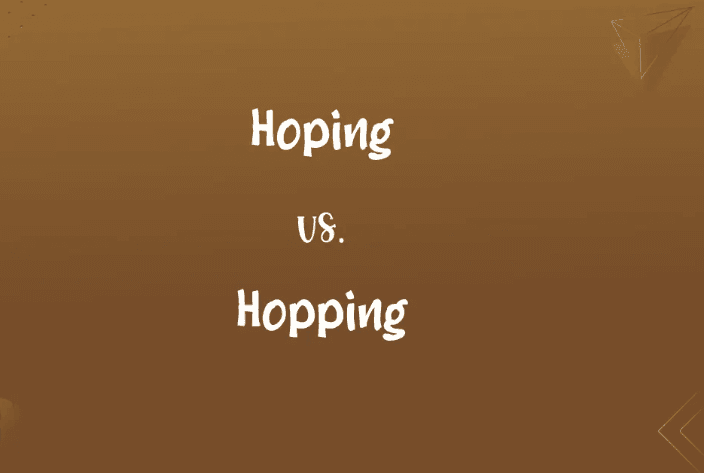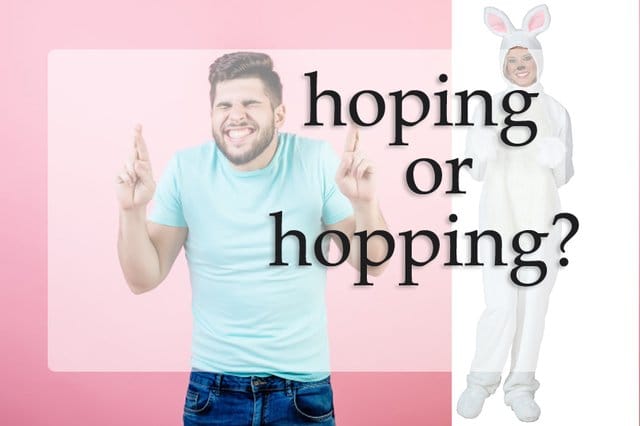Hoping vs. Hopping: A Clear Guide to Clearing the Spelling Confusion
Contents

The words 'hoping' and 'hopping' are spelt and pronounced quite similarly. But they carry entirely different meanings. 'Hoping', derived from the noun 'hope', refers to the act of desiring a particular outcome or event to occur. On the other hand, 'hopping' pertains to the act of jumping lightly and quickly on one foot or both.
Consider a common scenario: you're speaking English with your friends and say, "I'm hopping for a promotion this year". Your friends seem confused because they picture you jumping around for a job upgrade instead of desiring it. Mistaking 'hoping' for 'hopping' and vice versa is a common issue among non-native English speakers in India, leading to such humorous mix-ups in daily conversations.
This blog post aims to eliminate such confusion by providing clarity on the meaning of hoping vs hopping. Remember, mastering spelling and pronunciation is essential for effective communication. Even small errors can change the meaning of your sentences dramatically and mess up your intent. Let's dive deeper into understanding these terms and their correct usage!
What’s in a Word? Understanding Hoping and Hopping
When we're learning English, words that sound similar can often cause confusion. 'Hoping' and 'hopping' are two such words.
As mentioned earlier, hoping refers to the act of expressing a desire or expectation for something to happen. For instance, "I am hoping for good weather tomorrow."
On the other hand, hopping means jumping lightly off one's feet. For example, "The rabbit was hopping across the garden."
Here are some situations where each word would be used appropriately:
Word | Appropriate Situations | Examples |
Hoping | When making a wish or expressing a desire | "I am hoping to visit Shimla next summer." |
Making an optimistic prediction | "We are hoping that our team wins the cricket match." | |
Hopping | Descriptively in storytelling | "The children were hopping like kangaroos at the party." |
In expressions like ‘bar hopping’ | "We went bar hopping to celebrate our graduation." |
Tips to Remember the Difference Between Hoping and Hopping
1. Letter Count: Remember that 'hoping' has 6 letters, while 'hopping' has 7. The extra letter in 'hopping' can remind you that it involves an additional action – the physical act of jumping.
2. Connecting with Meaning: Connect the terms to their meanings. 'Hoping' is about expecting or wishing for something to happen, which is a mental activity. On the other hand, 'hopping' involves movement and physical effort, which demands more energy—like the double 'p' in it.
3. Looking out for context: Context plays a key role in determining the correct word choice. Imagine you're at a cricket match, eager for India to win. You'd say, "I'm hoping India wins today!" But if you see the cheerleaders dancing on the sidelines, you'd say, "Look at those cheerleaders hopping and dancing. They're so energetic!"
4. Pronunciation Practice: Rehearsing different sentences aloud can help strengthen your understanding. Try sentences like "I am hoping for a promotion this year" versus "The rabbit was hopping around in the garden."
Let's consider a quick role-play example:
Rohan: "What are you doing these days, Neha?"
Neha: "I've been hoping to find a new job soon."
Rohan: "Ah, I remember how anxious I was when I was in your shoes!"
Neha: "And what about you? How are your kids?"
Rohan: "They're great! My son has been hopping from one hobby to another during his summer break."
In this dialogue, Neha uses ‘hoping’ to express her ambition of finding a new job, whereas Rohan uses ‘hopping’ to describe his son’s alternating hobbies—a realistic situation that helps you remember the difference between the meaning of hoping vs hopping.
The Importance of Pronunciation: Hoping vs Hopping

Understanding the phonetics behind 'hoping' and 'hopping' can make a world of difference to your spoken English. The pronunciation nuances can be challenging, but with a little practice, you'll get the hang of it!
Let's explore these two words and their phonetics more closely:
Word | Sound |
Hoping | /həʊpɪŋ/ |
Hopping | /hɒpɪŋ/ |
Notice how 'hoping' has a long vowel sound /əʊ/, almost like you're saying 'hope'. On the other hand, in 'hopping', the vowel is short, like the 'o' in 'hot'. It's these tiny details that can contribute to clarity and accuracy in your pronunciation.
Don't worry about perfection right away; remember, practice makes perfect. With time and dedication, you'll be able to master these subtle differences and enhance your spoken English skills! Keep practising, keep learning.
Building Vocabulary: Practice Makes Perfect!
Mastering vocabulary, including the difference between hoping and hopping, requires consistent practice and a dedicated mindset. Let's keep in mind that vocabulary development is a skill, and like any other skill, it needs frequent exercising.
One effective method of enhancing your vocabulary is journaling. Write about your day, thoughts, or dreams using new words you've learned. This not only exposes you to the practical usage of the words but also cements them in your memory.
Reading regularly, be it newspapers or storybooks, can significantly improve your vocabulary and comprehension skills. You'll often come across similar-sounding words and their correct usage in context.
Consistently practising newly learned rules can also lead to mastery. For instance, use 'hoping' and 'hopping' in sentences throughout the day to firmly grasp their meanings.
Consider Clapingo, an effective tool for personalized spoken English coaching focusing on fluency, pronunciation, and vocabulary. It's designed specifically to help you conquer nuances in vocabulary like the meaning of 'hoping' vs 'hopping'.
Finally, remember to regularly revise our list of 100+ Daily Use English Words for Fluent Communication. So keep practising, stay motivated, and let's conquer this language together!
To learn more, check out this YouTube video:
Key Takeaways
Through our journey, we've solved the mystery of 'hoping' and 'hopping'. The difference lies not just in spelling but also in meaning, usage, and pronunciation. Understanding such nuances can transform your English communication. It's these small steps that lead to big successes in your language-learning journey.
Remember, it's okay to make mistakes. What matters is the continuous effort you put into learning and improving. As you tackle more such challenges with Clapingo, you'll notice your confidence building up. Find your way through the complex puzzle of English with determination and curiosity; soon, you'll be hopping from one milestone to another with hope and grace.
Frequently Asked Questions
1. What is the main difference between 'hoping' and 'hopping'?
The primary difference lies in meaning and usage. 'Hoping' refers to having an expectation or desire for something to happen, whereas 'hopping' means to jump lightly or quickly from one place to another.
2. Can the words 'hoping' and 'hopping' be used interchangeably?
No, they cannot. Using them interchangeably can change the whole context of a sentence. For example, saying "I am hopping for good results" instead of "I am hoping for good results" could lead to confusion and miscommunication.
3. How can I practice using ‘hoping’ and ‘hopping’ correctly?
Try using these words in daily conversations or write sentences with them; consistent usage will help you gain confidence!
Comments
Your comment has been submitted